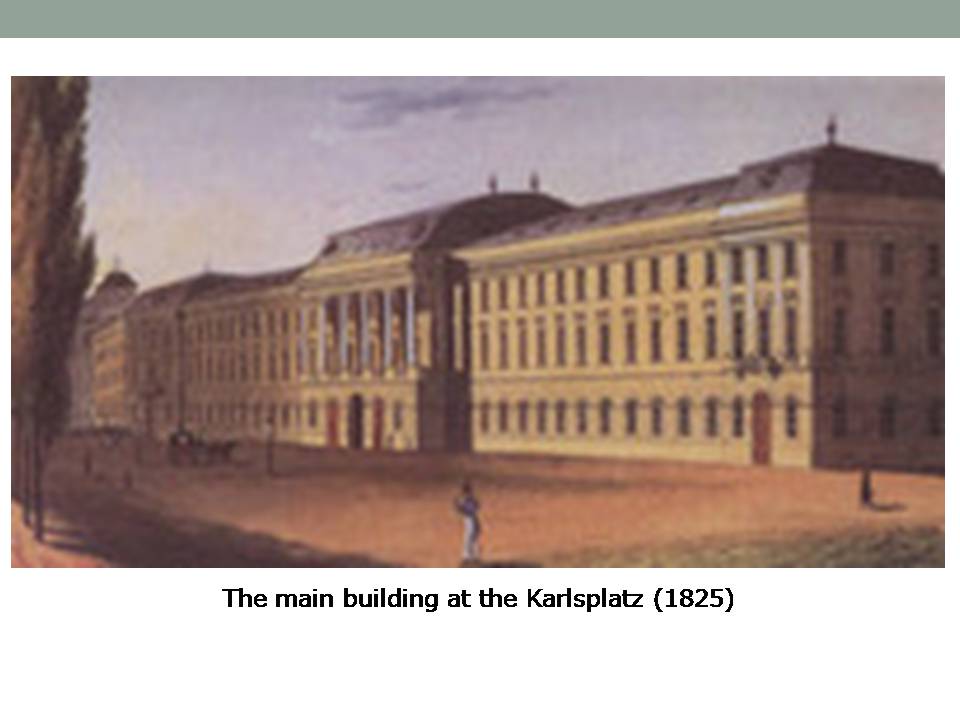- Головна
- Готові шкільні презентації
- Презентація на тему «TU Wien»
Презентація на тему «TU Wien»
383
Слайд #1
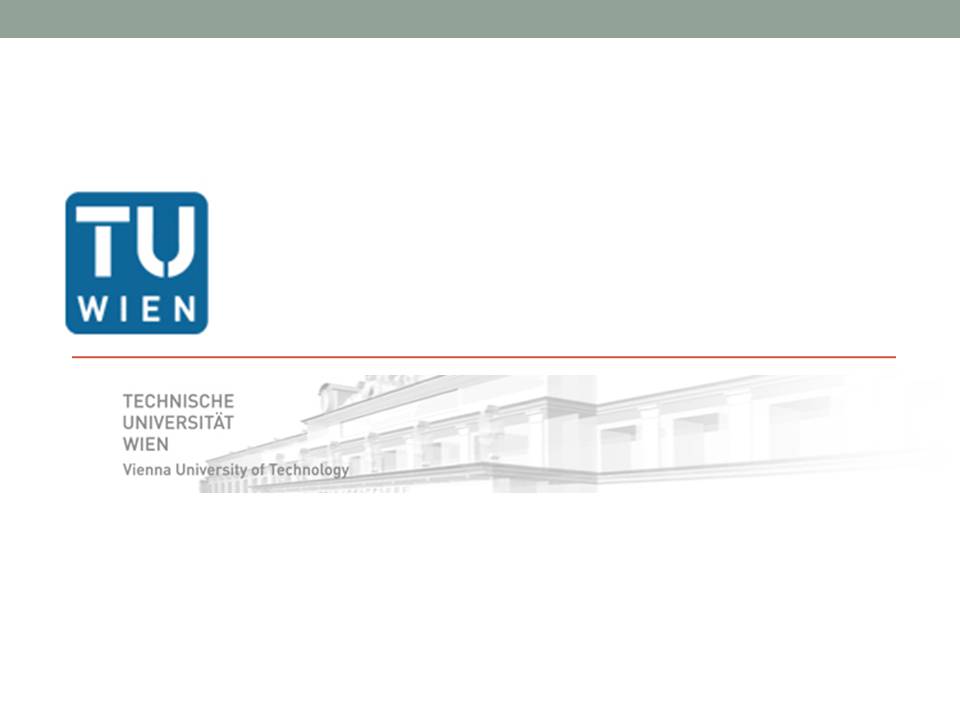
Слайд #2
About TU Wien
Our mission is “technology for people”. Through our research we “develop scientific excellence”, through our teaching we “enhance comprehensive competence”.
TU Wien has eight faculties lead by deans: Architecture and Planning, Chemistry, Civil Engineering, computer Sciences, Electrical Engineering and Information Technology, Mathematics and Geoinformation, Mechanical and Industrial Engineering, and Physics. The University is led by the Rector and four Vice Rectors (responsible for Research, Academic Affairs, Finance as well as Human Resources and Gender). The Senate has 26 members. The University Council, consisting of seven members, acts as a supervisory board.
Our mission is “technology for people”. Through our research we “develop scientific excellence”, through our teaching we “enhance comprehensive competence”.
TU Wien has eight faculties lead by deans: Architecture and Planning, Chemistry, Civil Engineering, computer Sciences, Electrical Engineering and Information Technology, Mathematics and Geoinformation, Mechanical and Industrial Engineering, and Physics. The University is led by the Rector and four Vice Rectors (responsible for Research, Academic Affairs, Finance as well as Human Resources and Gender). The Senate has 26 members. The University Council, consisting of seven members, acts as a supervisory board.
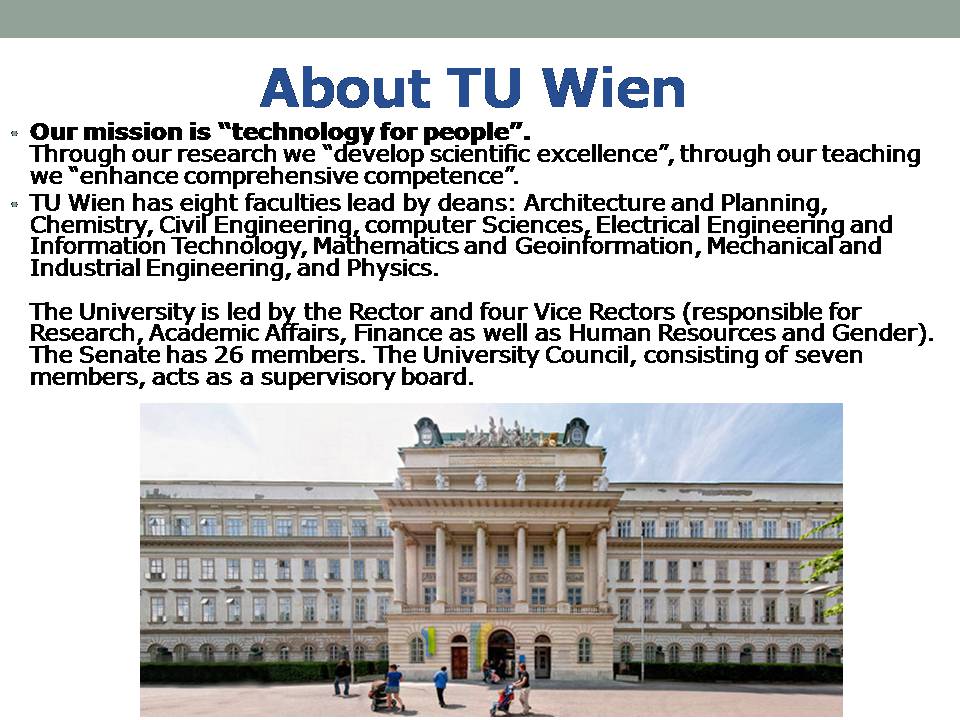
Слайд #3
Studies
The TU Wien places great emphasis on the inclusion of students in research programmes (researchbased teaching), considering this an important criterion encouraging new generations of scientists. The TU Wien offers a broad range of studies from "A" like Architecture to "T" like Technical Physics. Also Doctoral Programmes and Secondary School Teacher Accreditation are offered.
The TU Wien places great emphasis on the inclusion of students in research programmes (researchbased teaching), considering this an important criterion encouraging new generations of scientists. The TU Wien offers a broad range of studies from "A" like Architecture to "T" like Technical Physics. Also Doctoral Programmes and Secondary School Teacher Accreditation are offered.
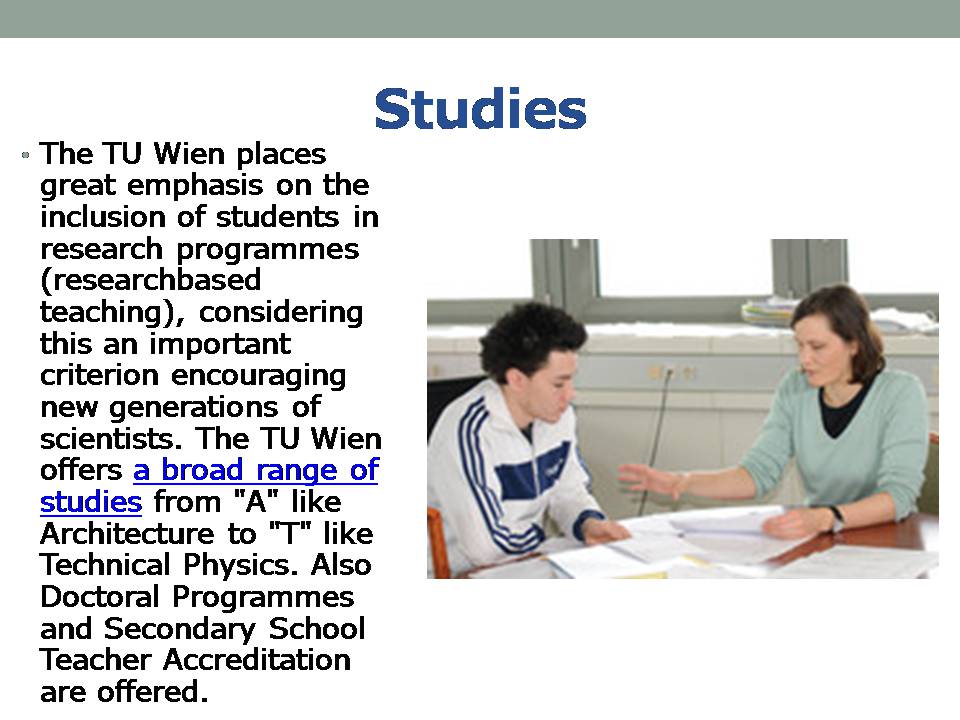
Слайд #4
Research
Development work in almost all areas of technology is encouraged, first, by the interaction between basicresearch and the different fields of engineering sciences at the TU Wien itself, and, secondly, within the framework of cooperative projects with other universities, research institutes and business sector partners. The TU Wien has sharpened itsresearch profile by defining competence fields and setting up interdisciplinary collaboration centres, and here clearer outlines will be developed.
Development work in almost all areas of technology is encouraged, first, by the interaction between basicresearch and the different fields of engineering sciences at the TU Wien itself, and, secondly, within the framework of cooperative projects with other universities, research institutes and business sector partners. The TU Wien has sharpened itsresearch profile by defining competence fields and setting up interdisciplinary collaboration centres, and here clearer outlines will be developed.
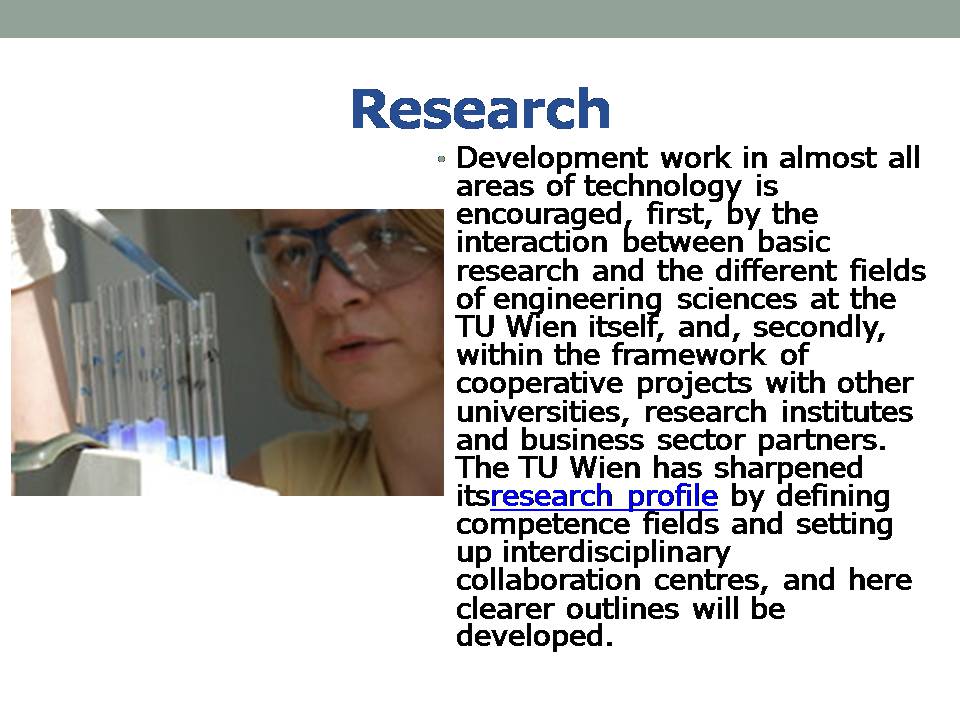
Слайд #5
Alumnae and Alumni
Among TU Wien's most known alumni are Christian Doppler (Doppler effect), Joseph Loschmidt (Loschmidt constant), architect Otto Wagner, Chemistry Nobel Prize laureate Richard Zsigmondy, Viktor Kaplan (Kaplan turbine), Alexander Meissner (feedback loop for oscillatory circuits), computer pioneer Heinz Zemanek (“Mailüfterl”), Gottfried Ungerböck (Trellis code modulation), as well as composers Josef and Johann Strauß, author Fritz von Herzmanovsky-Orlando and the founder of the anthroposophical movement, Rudolf Steiner.
Sucessful alumnae and alumni of these days are Franz Viehböck (Austria's 1st astronaut), Wolfgang Anzengruber (Chairman of the Managing Board Verbund), Susanna Zapreva (CEO Wienstrom GmbH), Theresia Vogel-Lahner (Climate and Energy Fund of the Austrian Government) and Ingeborg Hochmair-Desoyer (Cochlea implant).
Among TU Wien's most known alumni are Christian Doppler (Doppler effect), Joseph Loschmidt (Loschmidt constant), architect Otto Wagner, Chemistry Nobel Prize laureate Richard Zsigmondy, Viktor Kaplan (Kaplan turbine), Alexander Meissner (feedback loop for oscillatory circuits), computer pioneer Heinz Zemanek (“Mailüfterl”), Gottfried Ungerböck (Trellis code modulation), as well as composers Josef and Johann Strauß, author Fritz von Herzmanovsky-Orlando and the founder of the anthroposophical movement, Rudolf Steiner.
Sucessful alumnae and alumni of these days are Franz Viehböck (Austria's 1st astronaut), Wolfgang Anzengruber (Chairman of the Managing Board Verbund), Susanna Zapreva (CEO Wienstrom GmbH), Theresia Vogel-Lahner (Climate and Energy Fund of the Austrian Government) and Ingeborg Hochmair-Desoyer (Cochlea implant).
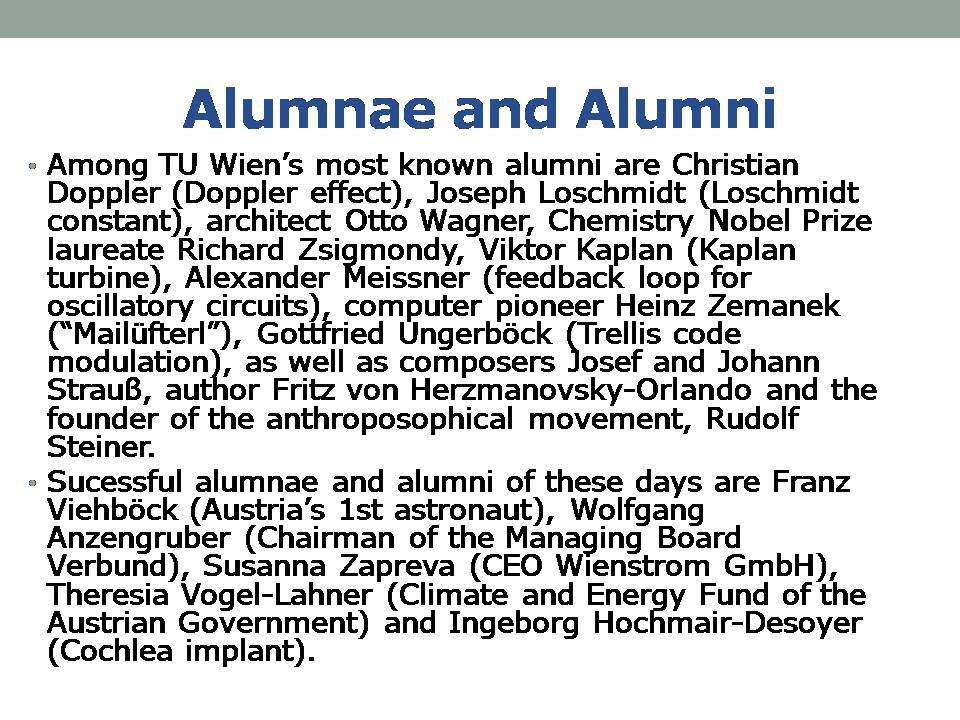
Слайд #6
Arts & Culture
The TU Wien is situated in the very heart of Vienna, in the pulsating cultural centre of town. Within easy walking distance are the Opera House, the art nouveau Secession building, the Musikverein, home of the Vienna Philharmonic, from which the New Year's Concert is annually broadcast around the globe, and the splendid baroque Karlskirche (Church of St. Charles). The TU Wien features its own two orchestras, Vienna's oldest ball (TU-Ball) and a public debate series (TU Forum).
The TU Wien is situated in the very heart of Vienna, in the pulsating cultural centre of town. Within easy walking distance are the Opera House, the art nouveau Secession building, the Musikverein, home of the Vienna Philharmonic, from which the New Year's Concert is annually broadcast around the globe, and the splendid baroque Karlskirche (Church of St. Charles). The TU Wien features its own two orchestras, Vienna's oldest ball (TU-Ball) and a public debate series (TU Forum).
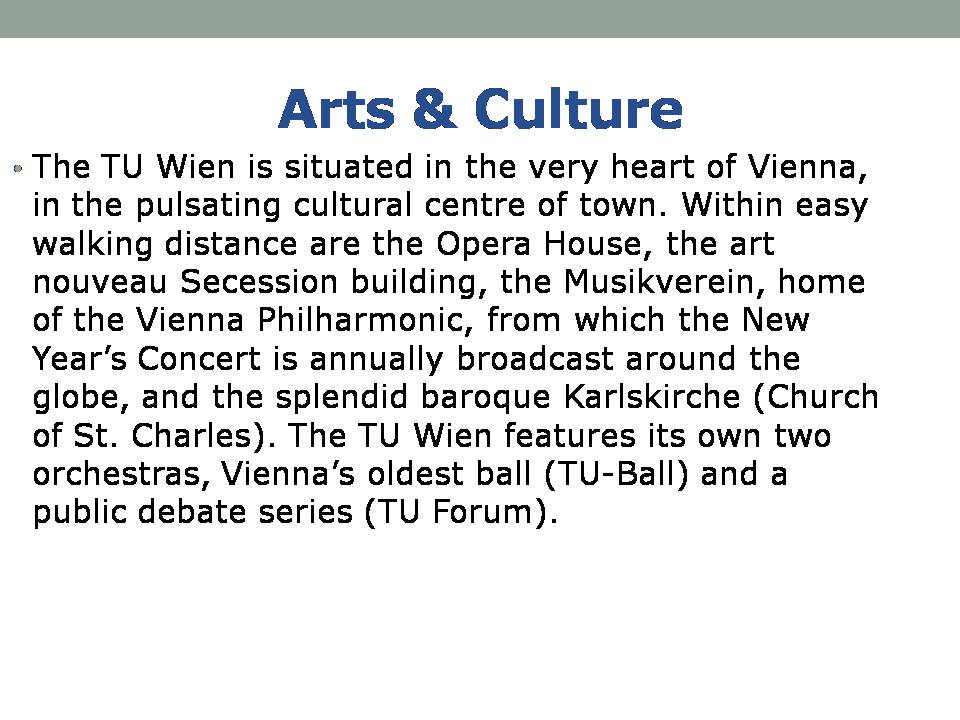
Слайд #7
Vienna's oldest ball (TU-Ball)
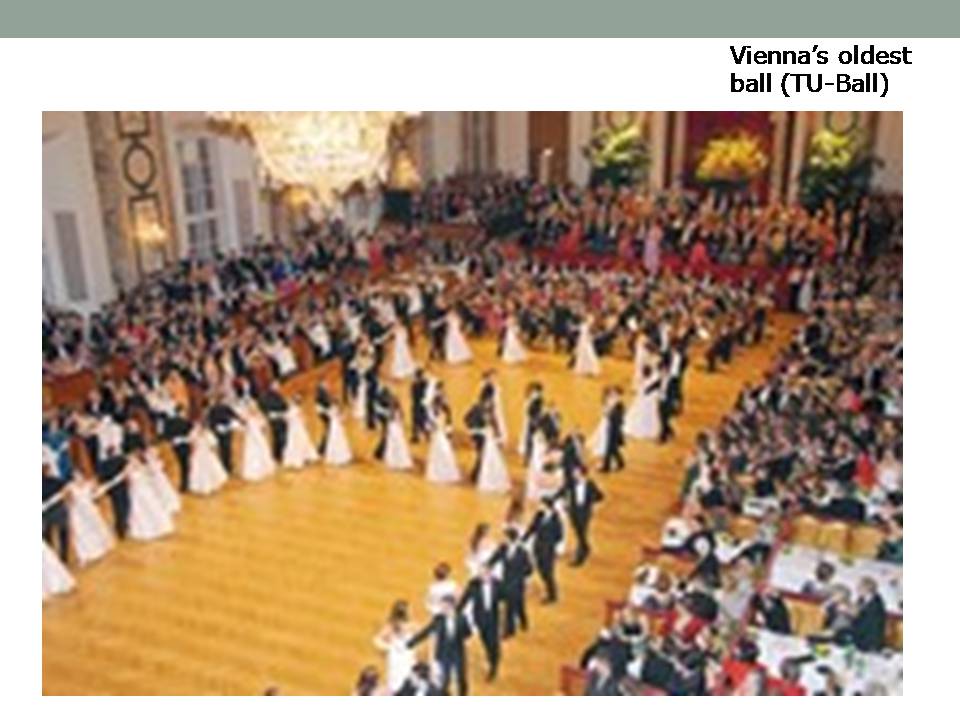
Слайд #8
Service providers
The main task of the service units is to efficiently support research and teaching as well as provision of services to the exterior. Apart from the IT Services and the library there are specific services for research, such as a microscopy centre (USTEM), a low temperature unit and a clean room laboratory. Teaching will be supported by the Department for Studies and Examinations and the Teaching Support Center. The offers of the Continuing Education Center, Research and Transfer Support and the Public Relations Office are orientated overwhelmingly to the exterior. Services are also offered for internationalisation as well as for our alumnae and alumni.
The main task of the service units is to efficiently support research and teaching as well as provision of services to the exterior. Apart from the IT Services and the library there are specific services for research, such as a microscopy centre (USTEM), a low temperature unit and a clean room laboratory. Teaching will be supported by the Department for Studies and Examinations and the Teaching Support Center. The offers of the Continuing Education Center, Research and Transfer Support and the Public Relations Office are orientated overwhelmingly to the exterior. Services are also offered for internationalisation as well as for our alumnae and alumni.
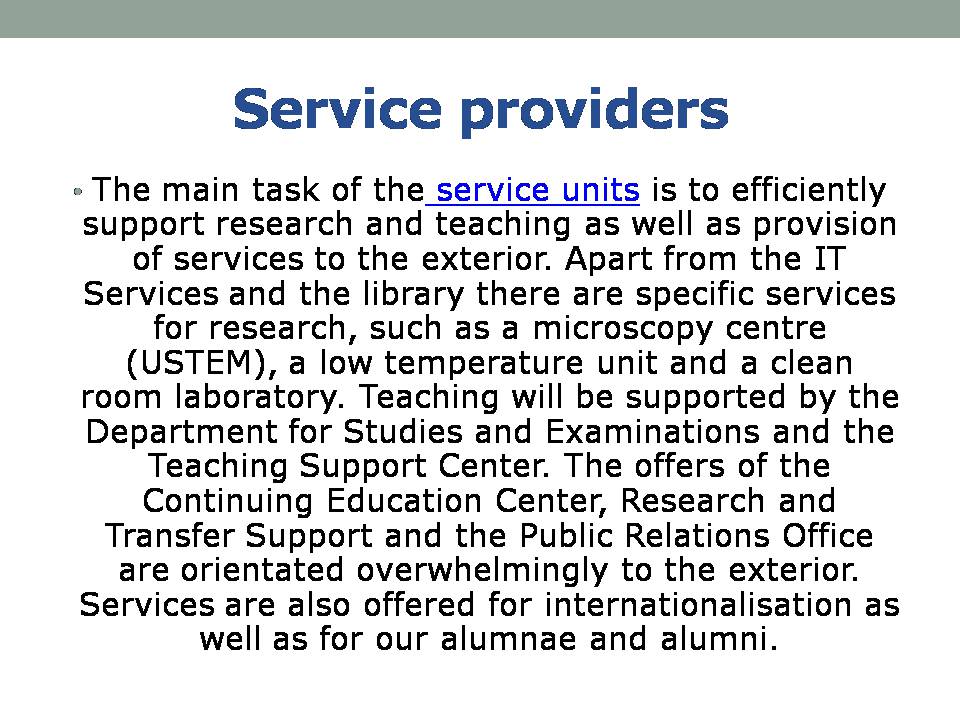
Слайд #9
Employees
The Vienna University of Technology is also dedicated to training apprentices. Extensive implementation of job planning and review meetings and an adequate training and further education offer should help to optimally promote the employees. It is also a great challenge to ensure equal chances for both genders.
In an expert organisation the employees are the crucial “capital”. Correspondingly personnel recruitment and development are very significant for success. Numerous awards show the quality of the scientists. Also the demands on “general personnel” have risen with autonomy.
The Vienna University of Technology is also dedicated to training apprentices. Extensive implementation of job planning and review meetings and an adequate training and further education offer should help to optimally promote the employees. It is also a great challenge to ensure equal chances for both genders.
In an expert organisation the employees are the crucial “capital”. Correspondingly personnel recruitment and development are very significant for success. Numerous awards show the quality of the scientists. Also the demands on “general personnel” have risen with autonomy.
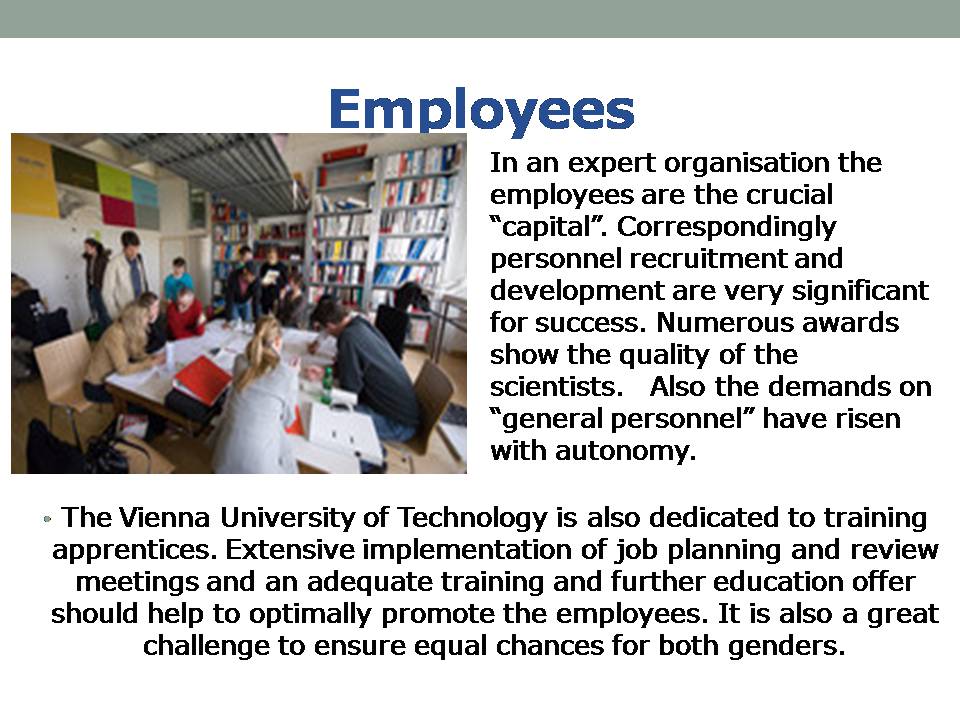
Слайд #10
Cooperation
The Vienna University of Technology is very successful when applying for competitively given public funding as well as in the implementation of research projects with employers from economics and / or public authorities (third party funds). Numerous collaborations have also been institutionalised in various forms. In this way, the TU Wien is involved in numerous competence centres, networks, projects and Christian Doppler laboratories and has a large share in the Priority Research programmes of the Austrian Science Fund (FWF).
The Vienna University of Technology is very successful when applying for competitively given public funding as well as in the implementation of research projects with employers from economics and / or public authorities (third party funds). Numerous collaborations have also been institutionalised in various forms. In this way, the TU Wien is involved in numerous competence centres, networks, projects and Christian Doppler laboratories and has a large share in the Priority Research programmes of the Austrian Science Fund (FWF).
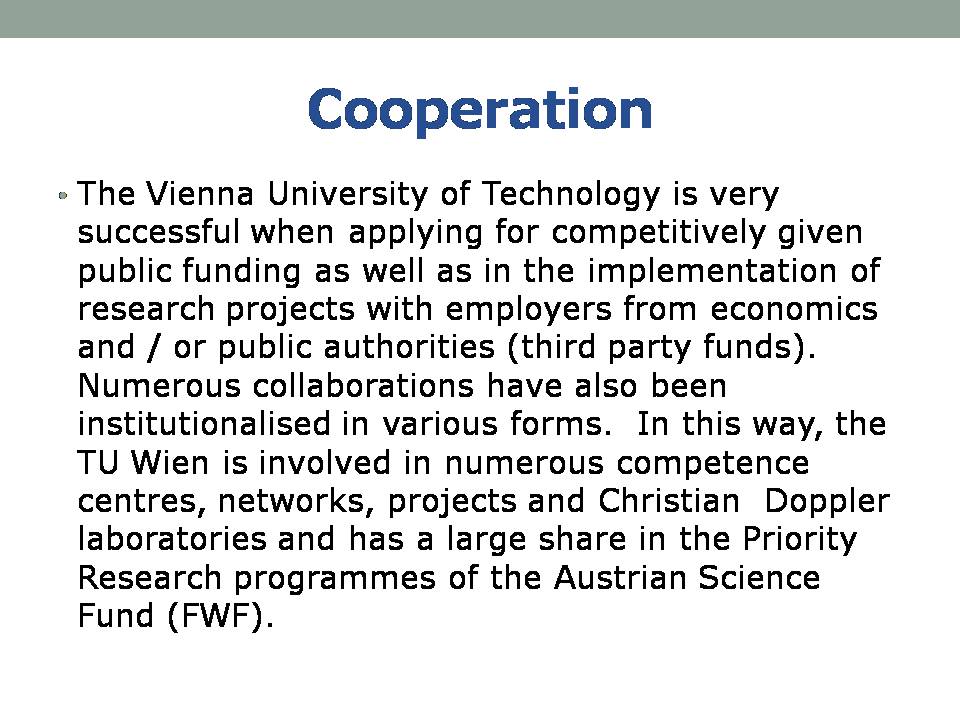
Слайд #11
International
International cooperations in research and teaching are an essential part of university activities in a global knowledge society. Successful participation in international programmes, networking in transnational communities as well as the strategic emphasis of
university partnerships support alumni and alumnae and researchers of the Vienna University of Technology to successfully gain international positions.
International cooperations in research and teaching are an essential part of university activities in a global knowledge society. Successful participation in international programmes, networking in transnational communities as well as the strategic emphasis of
university partnerships support alumni and alumnae and researchers of the Vienna University of Technology to successfully gain international positions.
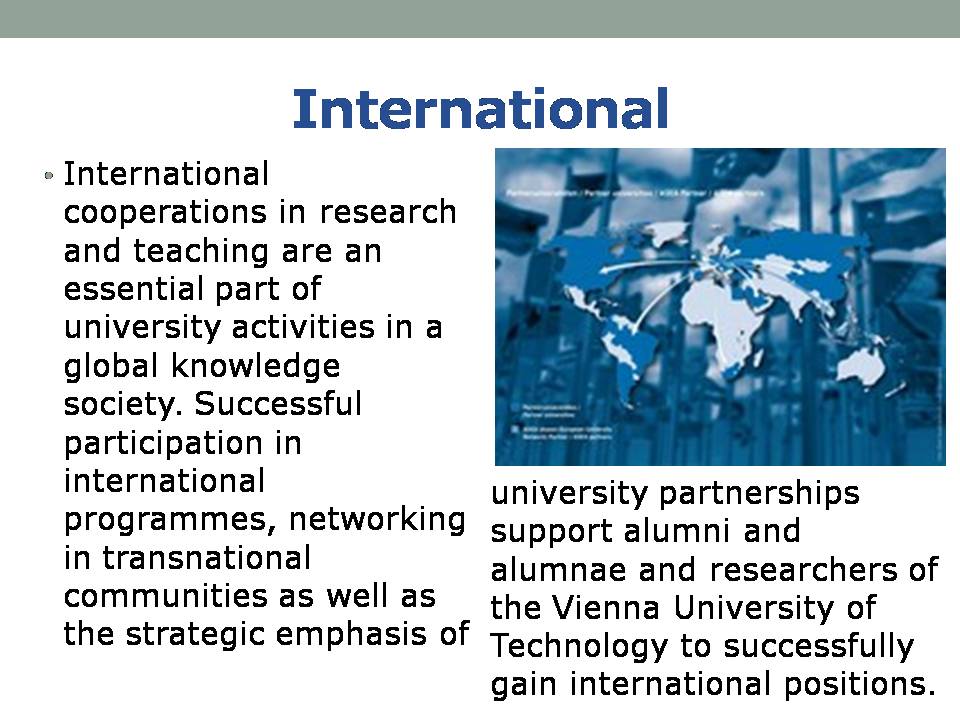
Слайд #12
History
TU Vienna looks back on a long tradition at the leading edge of scientific research and education: Founded in 1815 as k.k. Polytechnisches Institut (Imperial and Royal Polytechnical Institute), it was divided into 5 faculties in 1865. One year later the first freely elected rector was inaugurated.
In 1872 its name changed to Technische Hochschule (College of Technology), and in 1902 the first doctorates were awarded. The institution has borne its current name – Technische Universität Wien (Vienna University of Technology) – since 1975. In 2004 TU Vienna reached full autonomy through the University Act 2002.
TU Vienna looks back on a long tradition at the leading edge of scientific research and education: Founded in 1815 as k.k. Polytechnisches Institut (Imperial and Royal Polytechnical Institute), it was divided into 5 faculties in 1865. One year later the first freely elected rector was inaugurated.
In 1872 its name changed to Technische Hochschule (College of Technology), and in 1902 the first doctorates were awarded. The institution has borne its current name – Technische Universität Wien (Vienna University of Technology) – since 1975. In 2004 TU Vienna reached full autonomy through the University Act 2002.
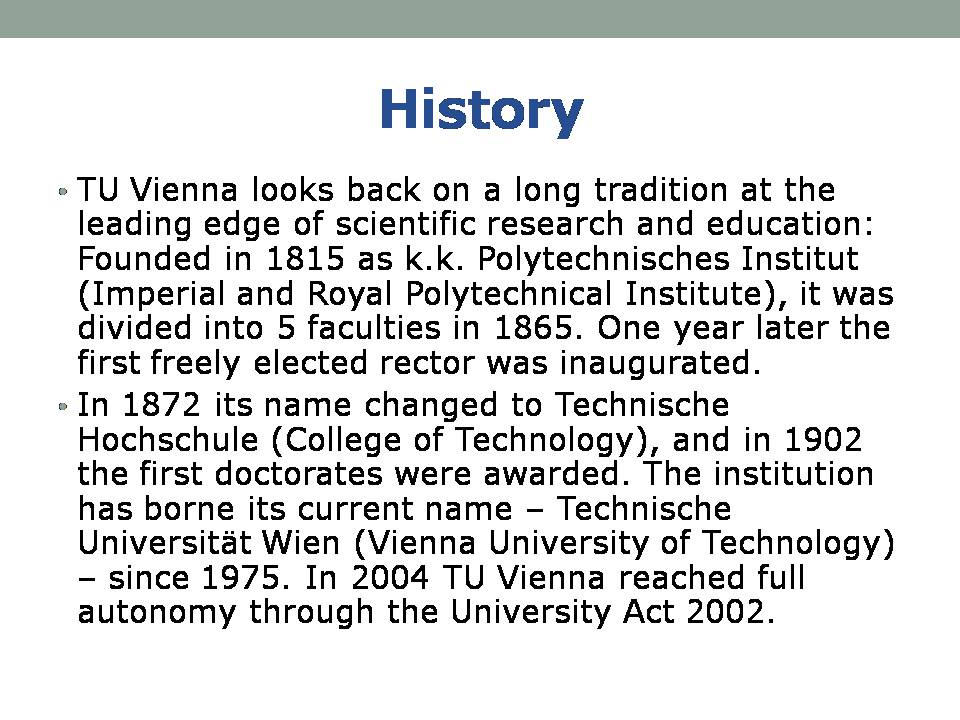
Слайд #13
The main building at the Karlsplatz (1825)
